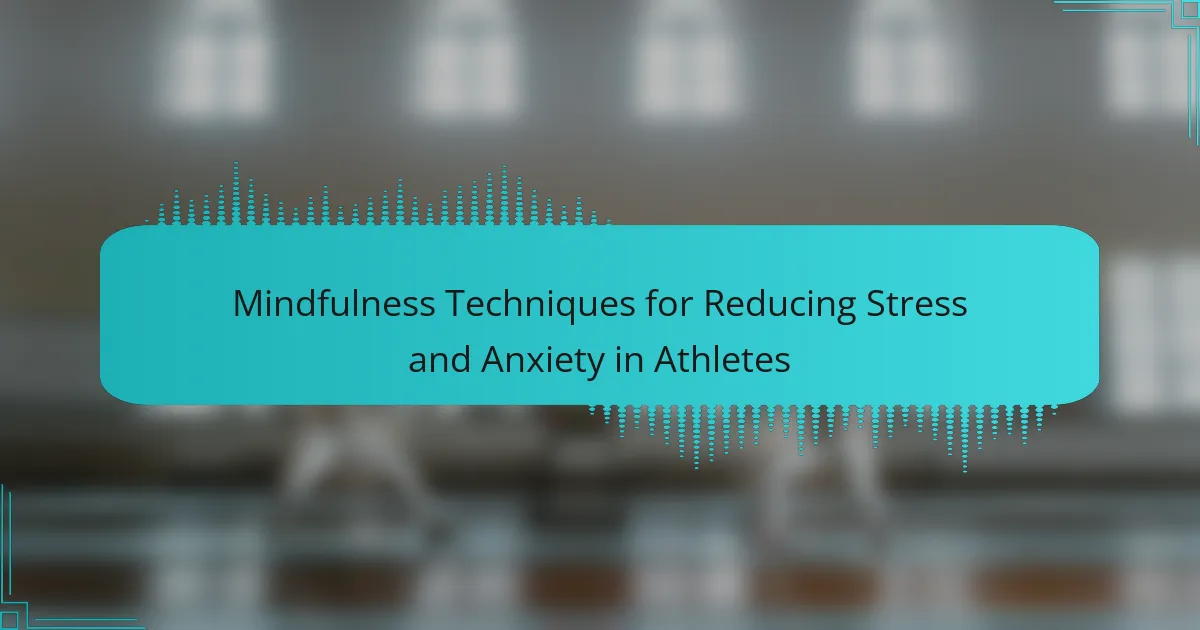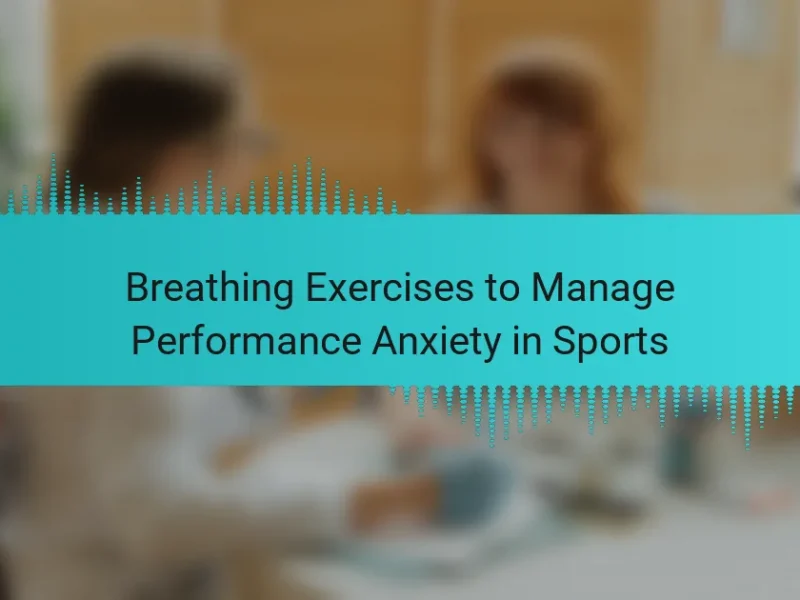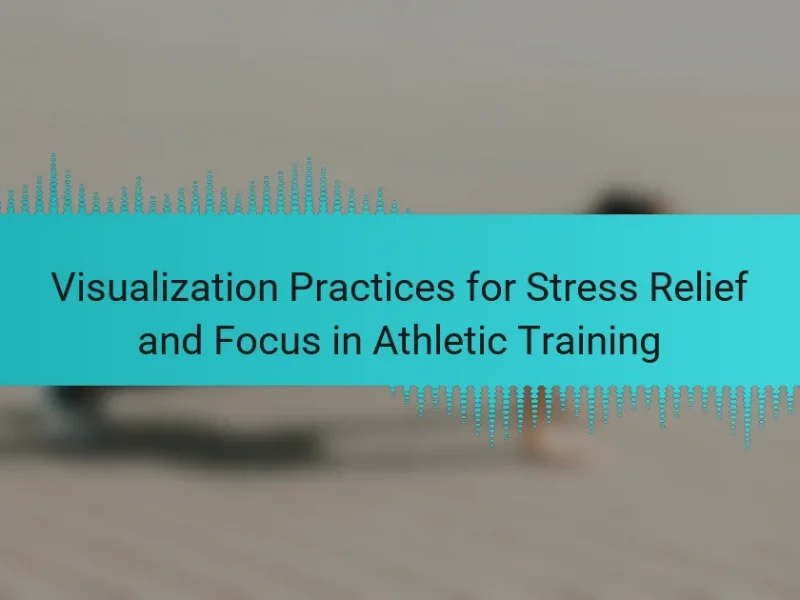Mindfulness techniques can effectively reduce stress and anxiety in athletes. Key practices include focused breathing, body scanning, visualization, and mindful movement. These methods enhance mental clarity, promote relaxation, and improve performance under pressure. Tailoring techniques to specific sports further boosts their effectiveness, while emerging practices like forest bathing and sound meditation offer additional benefits. Regular self-assessment and performance metrics help athletes measure the impact of these techniques on their mental resilience.
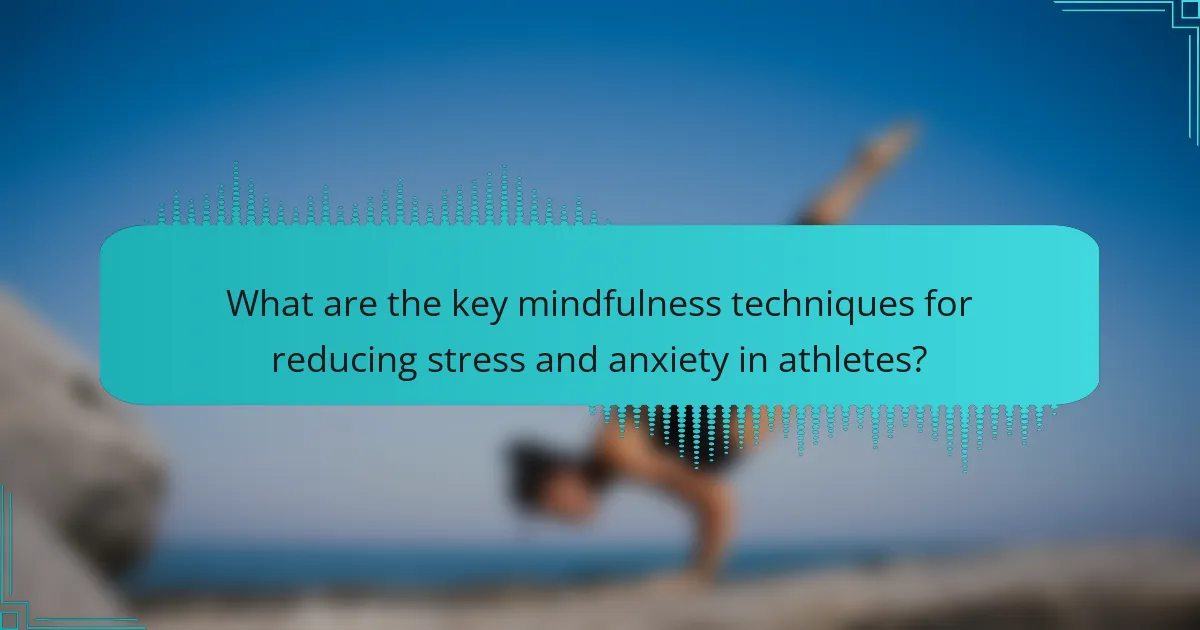
What are the key mindfulness techniques for reducing stress and anxiety in athletes?
Mindfulness techniques can significantly reduce stress and anxiety in athletes. Key techniques include focused breathing, body scanning, visualization, and mindful movement practices like yoga. These methods enhance mental clarity, promote relaxation, and improve performance under pressure. For example, focused breathing can lower heart rate and increase oxygen flow, helping athletes maintain composure during competitions. Body scanning encourages awareness of physical sensations, which can help identify areas of tension. Visualization aids in mental rehearsal, boosting confidence. Mindful movement fosters a connection between body and mind, improving overall well-being.
How does mindfulness impact athletic performance?
Mindfulness significantly enhances athletic performance by reducing stress and anxiety. Techniques such as focused breathing, visualization, and body scanning help athletes maintain concentration and emotional regulation. Research indicates that athletes who practice mindfulness show improved focus and resilience, leading to better performance outcomes. Regular mindfulness practice can also enhance recovery by promoting relaxation and reducing muscle tension, which is crucial for optimal performance.
What are the physiological benefits of mindfulness for athletes?
Mindfulness techniques enhance athletes’ physiological well-being by reducing stress and anxiety. These practices improve focus, increase recovery rates, and enhance overall performance. Regular mindfulness training can lower cortisol levels, leading to improved immune function. As a result, athletes experience better sleep quality, which is crucial for recovery and performance.
How can mindfulness improve mental resilience in sports?
Mindfulness significantly enhances mental resilience in sports by promoting focus and emotional regulation. Techniques such as deep breathing and visualization help athletes manage stress and anxiety, leading to improved performance. Regular practice cultivates a unique attribute of heightened self-awareness, enabling athletes to respond effectively to challenges. Research shows that athletes who engage in mindfulness report lower anxiety levels and greater confidence, which are crucial for peak performance.

What universal mindfulness practices can athletes adopt?
Athletes can adopt several universal mindfulness practices to reduce stress and anxiety. These techniques include focused breathing, body scans, visualization, and mindful movement.
Focused breathing involves concentrating on the breath to enhance awareness and calmness. Body scans promote relaxation by guiding athletes to notice tension in different body parts. Visualization helps athletes mentally rehearse performances, reducing anxiety about competition. Mindful movement incorporates techniques like yoga or tai chi, fostering a connection between mind and body.
Implementing these practices regularly can improve mental resilience and overall performance.
What is breath awareness and how can it be used in sports?
Breath awareness enhances focus and reduces anxiety in athletes by promoting mindfulness. This technique involves concentrating on breathing patterns to cultivate present-moment awareness. As a result, athletes experience improved performance and reduced stress levels. Implementing breath awareness can lead to better emotional regulation and enhanced concentration during competitions.
How does body scanning help athletes manage stress?
Body scanning helps athletes manage stress by promoting body awareness and relaxation. This mindfulness technique encourages athletes to focus on physical sensations, reducing anxiety and enhancing performance. Studies show that regular practice can lower cortisol levels and improve emotional regulation, making it a valuable tool for stress management. Body scanning fosters a unique connection between mind and body, enabling athletes to identify stress triggers and respond effectively.
What role does visualization play in mindfulness for athletes?
Visualization plays a crucial role in mindfulness for athletes by enhancing focus and reducing stress. It allows athletes to mentally rehearse performances, which can lead to improved execution during actual events. This technique cultivates a calm state of mind, helping manage anxiety levels. Research indicates that athletes who incorporate visualization techniques experience increased confidence and better emotional regulation. By vividly imagining successful outcomes, athletes can foster a positive mindset, which is essential for peak performance.
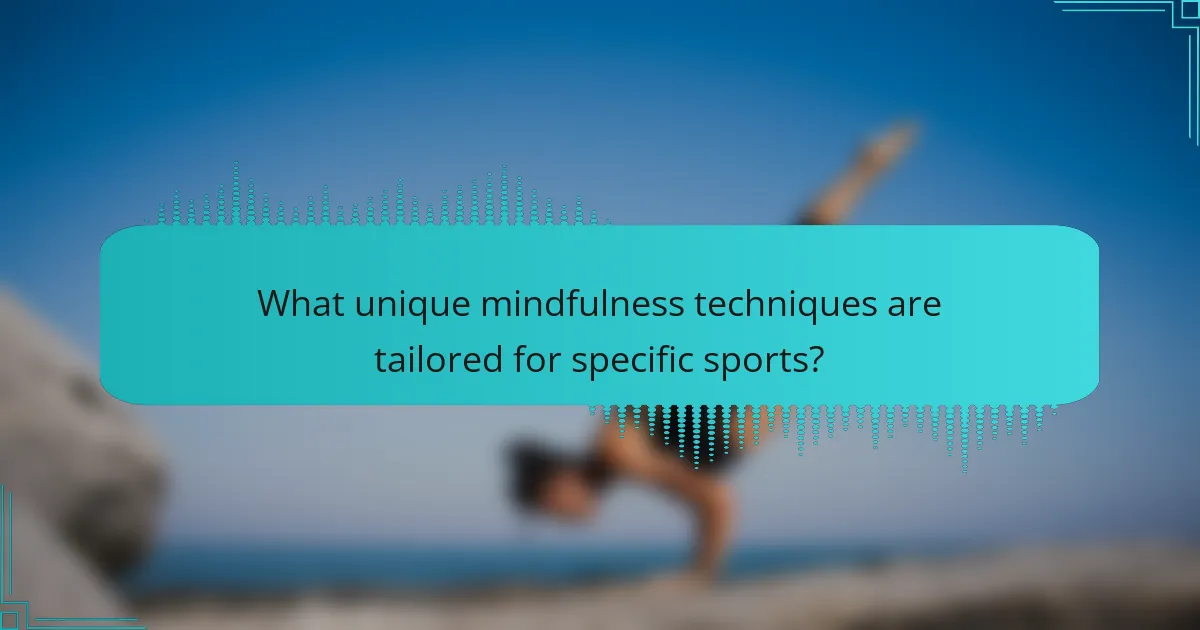
What unique mindfulness techniques are tailored for specific sports?
Mindfulness techniques can be tailored to specific sports to enhance focus and performance. For example, runners may benefit from breath-focused meditation to manage anxiety before races. Swimmers often use visualization techniques to imagine successful strokes and turns. Team sports athletes, like basketball players, might engage in group mindfulness sessions to build cohesion and reduce stress. Unique attributes of these techniques include their adaptability to the physical demands and mental challenges of each sport.
How can mindfulness be integrated into team sports training?
Mindfulness can be integrated into team sports training through focused breathing exercises, visualization techniques, and regular mindfulness sessions. These practices help athletes manage stress and anxiety, enhancing performance.
Breathing exercises promote relaxation and concentration, while visualization techniques allow athletes to mentally rehearse their performance. Regular mindfulness sessions encourage team cohesion and improve communication, fostering a supportive environment.
Incorporating these techniques not only reduces anxiety but also cultivates a positive mindset, which is crucial for peak athletic performance. Teams that practice mindfulness report higher levels of focus and resilience during competitions.
What unique mindfulness strategies benefit individual athletes?
Mindfulness strategies tailored for athletes enhance focus and resilience. Techniques like visualization, body scanning, and breath control uniquely benefit individual athletes by fostering mental clarity and reducing performance anxiety. These methods help athletes stay present, improving their overall performance. Additionally, incorporating mindfulness into training routines can lead to long-term stress reduction and increased emotional regulation.

What rare mindfulness practices are emerging in the athletic community?
Emerging mindfulness practices in the athletic community include techniques like forest bathing, sound meditation, and digital detox retreats. These practices aim to enhance mental clarity and emotional resilience. Forest bathing incorporates nature immersion to reduce stress, while sound meditation uses auditory stimuli for relaxation. Digital detox retreats encourage athletes to disconnect from technology, fostering deeper self-awareness. Each technique offers unique benefits, contributing to a holistic approach to athlete well-being.
How is mindfulness being combined with technology for athletes?
Mindfulness is increasingly integrated with technology to enhance athletes’ performance and well-being. Wearable devices monitor physiological responses, providing real-time feedback on stress levels. Apps offer guided meditation and breathing exercises tailored for athletes, promoting focus and relaxation. Virtual reality environments create immersive mindfulness experiences, helping athletes visualize performance scenarios. This combination of mindfulness and technology fosters resilience and improves mental clarity, essential for peak performance.
What innovative mindfulness workshops are available for athletes?
Innovative mindfulness workshops for athletes focus on enhancing mental resilience and reducing stress. These workshops often incorporate techniques like guided meditation, breathwork, and visualization exercises tailored for athletic performance.
One unique approach is the integration of virtual reality environments, allowing athletes to practice mindfulness in immersive settings. Another innovative method includes combining mindfulness with movement practices such as yoga or tai chi, promoting both mental and physical well-being.
Workshops may also feature expert-led discussions on the psychological aspects of competition, helping athletes develop coping strategies for anxiety. These sessions aim to create a supportive community where athletes can share experiences and insights.
Overall, these workshops provide a holistic approach to mental health, equipping athletes with essential tools to manage stress effectively.
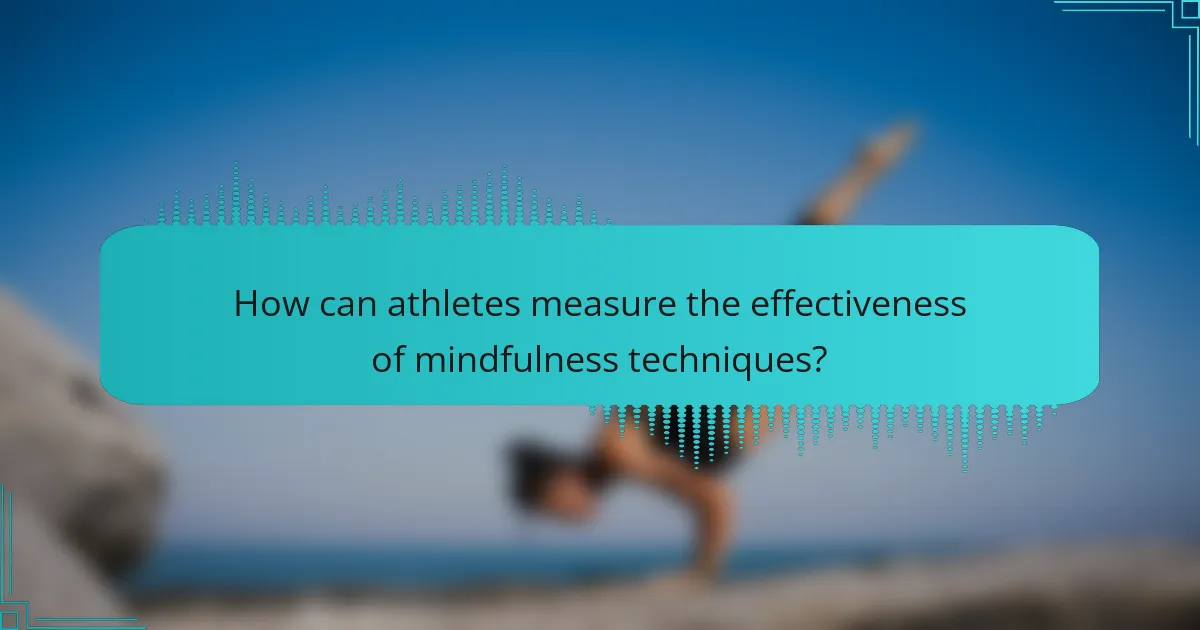
How can athletes measure the effectiveness of mindfulness techniques?
Athletes can measure the effectiveness of mindfulness techniques through self-assessment, performance metrics, and physiological indicators. Self-assessment involves tracking stress and anxiety levels before and after mindfulness practices. Performance metrics include analyzing improvements in focus, reaction times, and overall athletic performance. Physiological indicators can be monitored through heart rate variability and cortisol levels, providing objective data on stress response. Regular evaluations help athletes refine their mindfulness techniques for optimal results.
What tools can athletes use to track their mindfulness practice?
Athletes can use various tools to track their mindfulness practice, including apps, journals, and wearable devices. Popular mindfulness apps like Headspace and Calm offer guided meditations and progress tracking. Journaling can help athletes reflect on their thoughts and feelings, enhancing self-awareness. Wearable devices, such as smartwatches, can monitor physiological responses to stress, providing insights into mindfulness effectiveness.

What best practices should athletes follow to enhance mindfulness?
Athletes should practice mindfulness techniques such as meditation, deep breathing, and visualization to enhance focus and reduce stress. These methods help manage anxiety levels and improve overall performance. Regular practice can lead to increased awareness and emotional regulation, essential for high-pressure situations. Incorporating mindfulness into daily routines can significantly enhance mental resilience and clarity.
What common mistakes do athletes make when practicing mindfulness?
Athletes commonly make mistakes in mindfulness practice by lacking consistency, focusing too much on technique, and neglecting to integrate mindfulness into their training routine. They may also set unrealistic expectations, leading to frustration. Additionally, some athletes fail to recognize the importance of self-compassion, which can hinder their progress.
How can athletes optimize their mindfulness routines for better results?
Athletes can optimize their mindfulness routines by incorporating structured practices that enhance focus and reduce stress. Techniques such as deep breathing exercises, visualization, and body scans can significantly improve mental clarity and emotional resilience.
Regular practice of mindfulness meditation, even for short periods, can lead to measurable improvements in performance under pressure. For instance, studies show that athletes who engage in mindfulness report lower levels of anxiety and higher levels of concentration, which are critical for peak performance.
Incorporating mindfulness into daily training routines can be done through specific sessions dedicated to mental conditioning. Athletes can start with five to ten minutes of focused breathing or guided imagery before training or competitions. This unique approach helps create a mental framework that supports optimal performance.
Additionally, tracking progress in mindfulness practices through journals can provide rare insights into emotional patterns and stress triggers, allowing athletes to adjust their techniques as needed. By tailoring mindfulness routines to individual needs, athletes can achieve better results and enhance their overall well-being.
